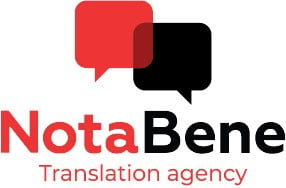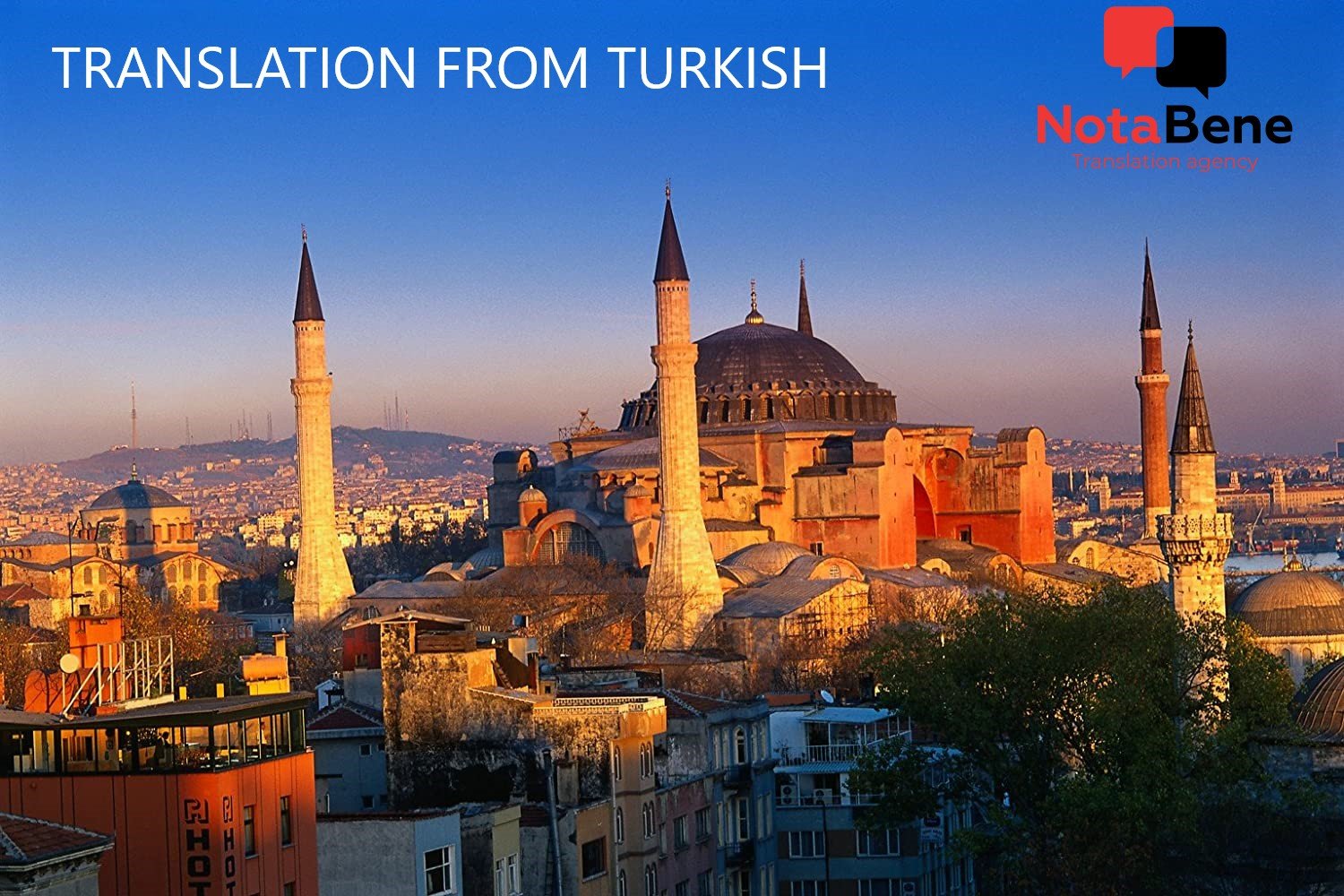Order translation from Turkish or into Turkish at NotaBene Agency in Warsaw or Gdansk!
NotaBene Translation Agency is an experienced supplier of translation from Turkish into Polish and vice versa for any documents or texts.
What types of texts does NotaBene Translation Agency work with?
– Technical translation from Turkish — we translate any texts in electronics, aviation and shipbuilding, agriculture, industry, oil and chemistry, etc. For this purpose, we pick translators who understand the specific nature of a given industry.
– IT translatons from Turkish for the localization of applications, games, software and websites.
– Medical translation from Turkish — books, manuals, articles in specialized printed and online publications, clinical records, correspondence with medical institutions, transcriptions and translations of test results, instructions for medicines and many other types of texts. This kind of translation requires flawless knowledge of medical terminology and focus on detail to rule out ambiguity, because the result can affect the health or life of many people.
– Legal translation from Turkish: statutes, registration deeds, articles of incorporation, contracts, powers of attorney, court records and many other similar documents.
– Financial translation from Turkish includes the translation of balance sheets, tax returns, payment invoices, waybills, tender documents, etc.
– Literary or fiction translation from Turkish of fiction, marketing and advertising materials. Unlike the previous types of translation, in this case there is more room for a translator’s creativity, because there is no need for “word for word” translation. The most important thing is that the translated material produces the same impact as the original, while an excellent translation may even make it better.
Please note that the translation mentioned is certified by an agency seal only. If you need sworn translation, kindly notify your manager in advance. Sworn translation is possible only for certain languages.
How to have a translation from Turkish into English, Polish, Russian, Belarusian or Ukrainian?
First of all, you need to order it. To do so, send your source text and specify your requirements for the translation from Turkish. A customer service specialist at the Nota Bene Translation Agency will prepare a ToR based on the specific features of the order. If the project involves more than one job, a unique glossary is created to ensure the consistency and proper use of terminology.
An entire team of several professionals normally works on a job: a translator, proofreader, editor, quality controller, layout designer and manager who will be available during working hours. In order to rule out human errors, the translation agency uses modern services to check punctuation, idioms, numerical expressions, and formulas. The material is also reviewed by the chief editor.
Confidentiality of translated data is ensured by a special NDA, whenever a customer wishes to have one. Documents can be delivered to any country.
We very rarely apply additional fees for “urgency” or “specialized subjects”, so you can be sure that the price will not rise when the project is delivered. It is true that in rare cases, such as “we need to have it yesterday” instances, and when a customer is willing to pay a higher rate for the team to work outside normal working hours, at night or on weekends, the fee might be increased, but this is always negotiated with the customer in advance.
Interesting facts about Turkish
With the economic development of Turkey and its increasing importance on the world stage, the Turkish language is becoming more and more popular. Although it is not amongst the top ten Turkish languages, it is already amongst the most widely spoken.
1. Turkish belongs to the South-Western subgroup of Turkish languages. Knowing Turkish, one can understand other Turkic languages: Azerbaijani, Tatar, Kazak, Uzbek, Turkmen, Kirghiz, Bashkir, Yakut, and many others. However, Turkish is spoken by 40% of the world’s Turkic speaking population, making it the most widely spoken language in this subgroup.
2. Turkish is spoken by 73 – 77 million people around the world. About 60 million of them live in Turkey. Very many Turks live in the USA, Canada, Australia and Western and Eastern European countries. There are especially many of them in Germany, over 2 million.
3. The Turkish language has a large number of dialects, some of which are quite different from each other. Different regions may not be immediately intelligible to one another. The Istanbul dialect serves as the basis for literary Turkish and therefore for translation from Turkish.
4. It is considered that the literary Turkish language began to form in the 15th century, based on the dialects of the inhabitants of the Anatolian Peninsula. A great number of borrowings from Arab and Persian languages were made. According to some information by the beginning of XIX century about 80% of all Turkish words were of foreign origin. That is to say, the language spoken in the Ottoman Empire was, in fact, just a mixture of three languages, among which Turkish played far from the most important role.
5. The Ottoman Empire used the Arabic script, which was borrowed in the 10th century. It was not well suited to the Turkish language, which made the writing process inconvenient and difficult to learn, resulting in a huge number of illiterates. In 1922, after the Turkish Republic was formed, a profound reform of the Turkish language began. First of all the Latin alphabet was adopted, which simplified the process of writing and increased literacy among all strata of the population. At the same time the Turks gave up the letters Q, W and X, which they simply did not need.
6. Also, as part of the language reform, there was a struggle with words of foreign origin, which in fact continues to this day. Turks today are reluctant to borrow foreign words, preferring to replace them with their own equivalents. For example, instead of the word “computer” they use “bilgisayar”, which literally means “processing information”.
7. In order to implement this reform successfully, Kemal Ataturk, the founder and first president of the Republic of Turkey, has set up the Turkish Language Association (TDK) in 1932. It was an enormously successful organisation. In fact, the TDK created a new language by developing many neologisms. As a result, for a long time, the language of the old men was simply incomprehensible to the young, who were already learning by completely new rules and standards.
8. Turkish is interesting because it has almost no grammatical exceptions. At the same time it is phonetic; words are read as they are written. Nouns do not have genders, and verbs do not change their endings depending on the gender. Words in a sentence always have a fixed position. This and some other factors greatly simplify learning.
9. Don’t think though, that Turkish is an easy language. Some of its grammatical features are exotic from the point of view of the European. Therefore, Turkish is an agglutinative language, in which different affixes and suffixes are added to a word and, as a result, it changes its grammatical form. The end result can replace an entire sentence. All this is very unusual for a native speaker of a flexive language like Russian or German.
We have been in business for over 20 years and during that time we have learned to work well. Trust us with your translation from Turkish and get a great result at a reasonable price!








